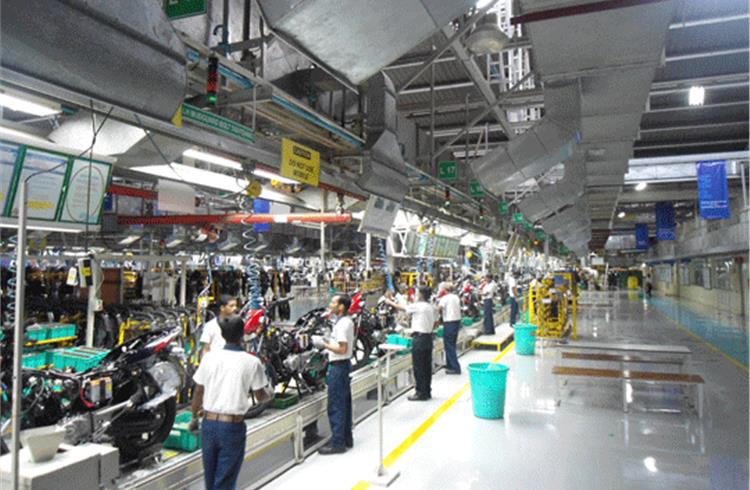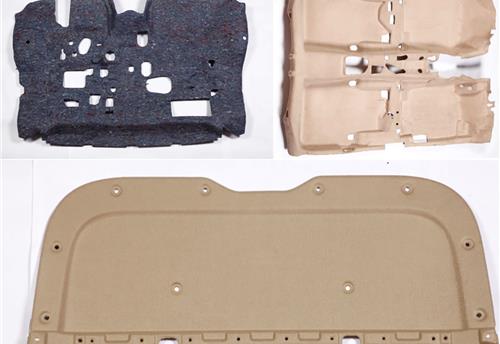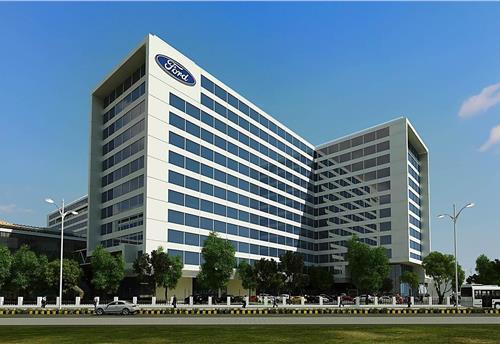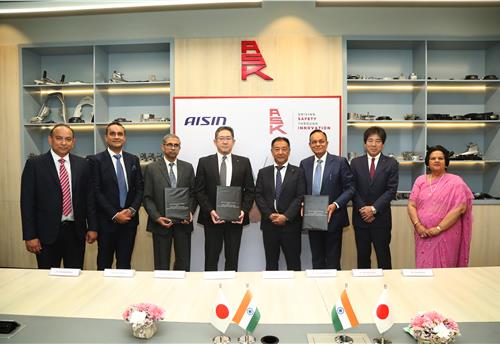Rajiv Bajaj issues ultimatum to striking workers, likely to shift part production from Chakan to other plants
Pune, August 5, 2013: As the ongoing tussle between Bajaj Auto Ltd (BAL) and Vishwa Kalyan Kamgar Sanghatna (VKKS) entered its 42nd day today, addressing a media gathering at the Akurdi plant, Rajiv Bajaj, managing director, BAL said that he may be compelled to shift up to 50 percent production operations from the Chakan facility to the Waluj (Aurangabad) and Pant Nagar facilities in the foreseeable future as a “semi-permanent” solution.
 |
"From today, I am giving my colleagues another one week's time (August 12) to resolve the matter. If the matter is not resolved by then, the company will be compelled to work towards shifting nearly 50 percent production operations from the Chakan plant to other plants. I am making an appeal to all workers to come back to work and restore normalcy at the Chakan plant. While as a temporary solution to the ongoing issue, we have already established a near one-third production shift from Chakan to Waluj. If normal operations at Chakan are not reinstated, production of nearly 1,500 motorcycles will be permanently embedded at the Waluj facility soon," said Bajaj. Despite a substantial number of workers not reporting at work at Chakan, BAL is currently rolling out around 2,050-2,100 units at the plant every day while Waluj is contributing between 1,000-1,500 units per day. Rajiv Bajaj highlighted that the company would be required to move selective equipment from Chakan to other plants, boost the manpower and request some existing vendors to move their resources to Pant Nagar and Waluj accordingly. "The cost of doing so might run into a few lakhs or crores for us, which is negligible for BAL. We cannot stake the sales of the remaining year and I have to set an agenda for the upcoming board meeting on September 24," he added. Explaining his tough stand against the stoppage of work by the striking workers, he said that one of the possible implications of 50 percent production shifting out of Chakan would leave the company with the option of requiring only 50 percent of the existing of manpower at work (which is already reporting at work). Bajaj said that "management must manage. We are losing our patience now. However, we are willing to continue being patient for some more time. But we would be forced to take a tough stand if no solution is reached. We haven't worked out any time frame or costs involved in shifting out our operations yet. If things continue, then I will propose this idea in our upcoming board meeting. Shifting out production from the Chakan facility will definitely be a significant issue in the history of automotive production operations at the Chakan belt."
BAL offers 6-point solution
Putting out a six-point solution to the ongoing problem, BAL officials mentioned that the union of workers must withdraw the demand of stock options, withdraw the strike and get back to work undertaking 'good conduct', withdraw the notice which terminated the settlement (BAL-VKKS) honoring all agreed terms, nominate a negotiation team of Chakan members representing adequate sections, 22 workers to undergo the enquiry proceedings and reinstatement of normal production operations at Chakan for the salary review process to start.
According to BAL officials, of the 22 workers who are required to undergo the enquiry proceedings, seven would be charged with minor punishments as they carry a clean track record, after which they will be absorbed back by the company. Meanwhile the remaining 15 workers would be required to undergo serious enquiries and the company will take a decision depending on the verdict. The enquiries would be carried out by practicing lawyers, retired judges and ex-labour department officers. Kailash J Zanzari, vice-president (manufacturing, motorcycles), BAL, estimated that an enquiry may last an average of three months. Underlining solutions, Bajaj said that "the issue of shares is dead and buried because it has not found any traction anywhere. In fact, it has been ridiculed and it is now in comatose stage and will never wake up. The issue of not reinstating the agreement (BAL-VKKS) is also dead now. Even a new agreement would be very similar to the terminated copy. The only issue left now is that of the pending enquiry cases against the 22 workers. I say that the management is willing to move ahead, let the seven workers (of 22 workers) come back to work after minor punishments. To buy peace today, we cannot compromise on the work culture of the industry in the region. The guilty should be punished. I must also say that punishment does not mean that they will lose their job. The company is incurring no losses. In fact, the ones who are sitting at home and not getting salaries are at a loss."
According to BAL data, 901 workers reported at work at Chakan on August 3 and 4, and 853 on August 2. To enable smooth operations, the company says it has organised food and lodging of nearly 200 workers within the vicinity of the Chakan facility. Bajaj Auto is now rolling out 3,500 motorcycles (including KTMs from Chakan; Pulsars from Chakan and Waluj) every day. On the sidelines of the press conference, Pradeep Shrivastava, chief operating officer, Bajaj Auto, told Autocar Professional that the company has started exporting the Pulsar 200 NS motorcycle (made at Chakan) to Indonesia for retail sales through Kawasaki Heavy Industries. The Pune-based firm exported 500 units of the same during July and plans to export a batch of 1,000 Pulsar 200 NS during August to Indonesia.
AMIT PANDAY
RELATED ARTICLES
Uniproducts India targets 15% growth till FY2027, eyes new EV OEMs for NVH parts
The Noida-headquartered company, which is a leading manufacturer of roof liners, floor carpets, sound insulation materia...
Ford to build more EV software capability at Chennai tech hub
Ford Business Solutions India, which currently employs 12,000 personnel set to add 3,000 more; Ford, which is known to b...
ASK Automotive to set up JV with Aisin to sell aftermarket parts for cars
Ask Automotive will have 51% of the equity of the joint venture to be set up with Aisin Asia (Thailand) Company and Aisi...





 By Autocar Pro News Desk
By Autocar Pro News Desk
 05 Aug 2013
05 Aug 2013
 5399 Views
5399 Views









